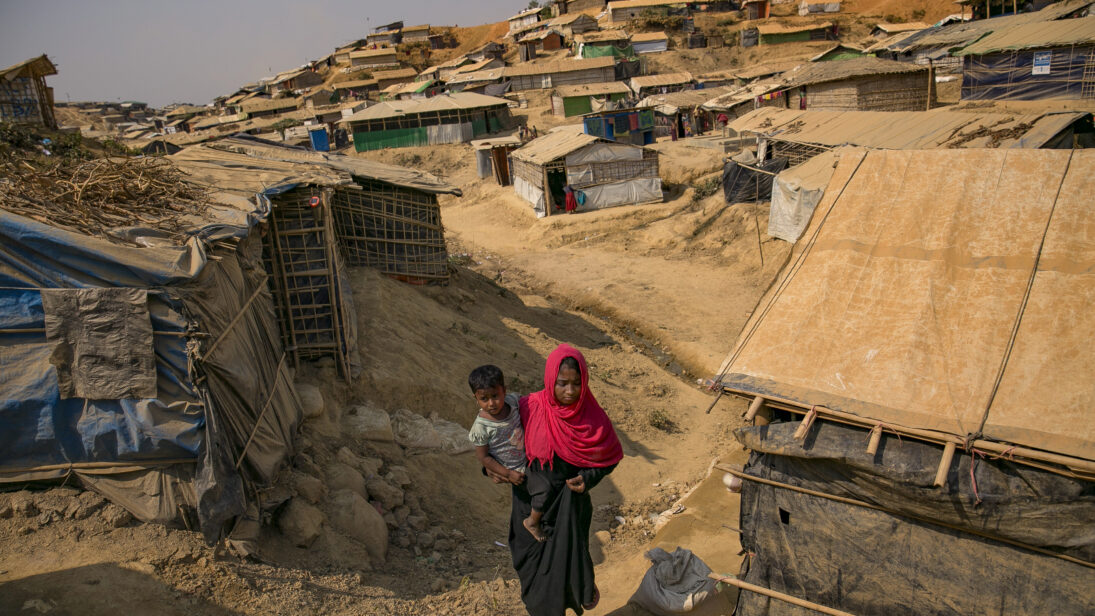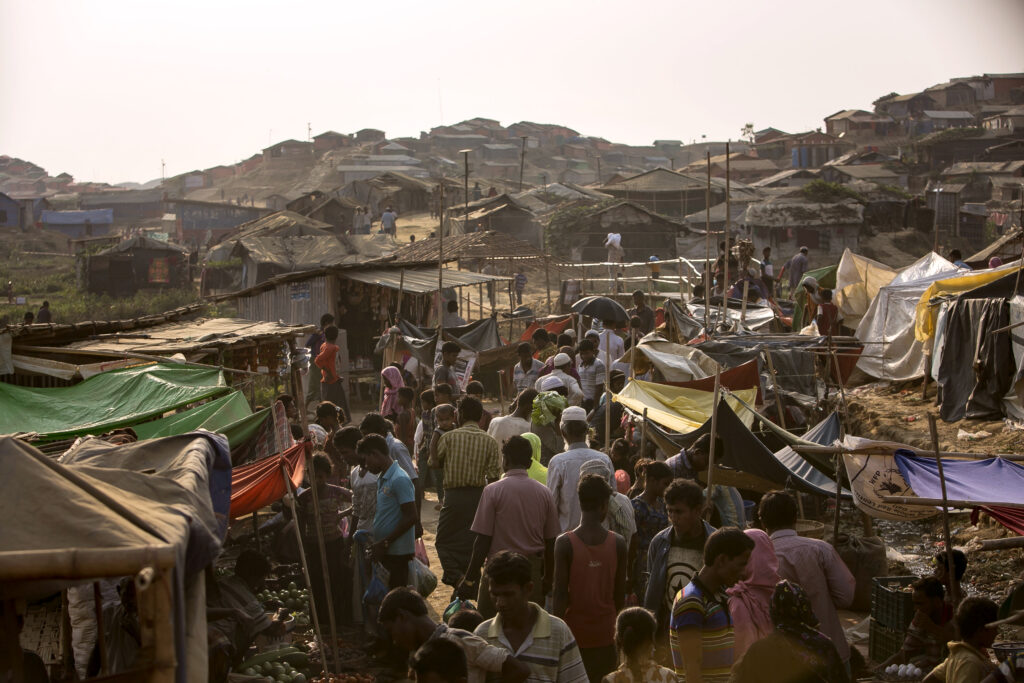
On 22 March 2023, the Myanmar government announced that it would start repatriating 1,140 Rohingya refugees from Bangladesh starting from mid-April. The pilot repatriation program took off owing to mediation efforts by China, Asia’s rising power that maintains close ties with both Bangladesh and Myanmar. Notably, the other regional power in South Asia, India, has largely been inactive in the process of the repatriation of Rohingya refugees so far.
Brutal state repression in Myanmar and decades of ethnic persecution have compelled thousands of Rohingyas to take shelter in Bangladesh and India since the 1970s. The lack of funding, organization, international aid, and adequate refugee policies has led to disastrous humanitarian challenges for the refugees. Further, the presence of the million-plus Rohingya has created several social, economic, security, and political challenges in Bangladesh and India, two countries already struggling to meet the needs of their own citizens. It would be beneficial for India to display more interest in this process for a number of geopolitical and security reasons.
Repatriation of Rohingya Refugees and the Indian Strategic Calculus
While India had initially provided some aid for the Rohingya refugees, New Delhi has so far refrained from taking a proactive position in facilitating repatriation. In fact, despite its cordial relations with Bangladesh, India has consistently backed Myanmar at the United Nations (UN) and at the bilateral level on the Rohingya issue. Due to the inability for repatriation to occur thus far, the otherwise cordial bilateral relations between Dhaka and Nay Pyi Taw have been negatively affected.
In fact, despite its cordial relations with Bangladesh, India has consistently backed Myanmar at the United Nations (UN) and at the bilateral level on the Rohingya issue.
The Rohingya crisis has created a number of security threats for Bangladesh and India both. According to the Indian government, Rohingya refugees in India are vulnerable to radicalization. Indian intelligence agencies have reported that Pakistan-based militant groups might exploit Rohingya refugees in India and incite intercommunal clashes. Furthermore, parts of the Indian population are dissatisfied with the prolonged presence of Rohingya refugees in Indian territory, and thus Rohingya have become a sensitive domestic political issue in India.
Similarly, the protracted Rohingya refugee crisis can potentially generate a number of security threats for Bangladesh, including radicalization, terrorism, infighting among refugees, and interethnic conflict. Rohingya refugees in Bangladesh, primarily concentrated in refugee camps in Cox’s Bazar and on the Bhashan Char Island, face severe food, health, personal, and community security risks which might exacerbate the threats that Bangladesh is facing. Therefore, the resolution of the crisis would remove a source of potential political tension and security risk for both Bangladesh and India.
India should assist in repatriation to earn Bangladesh’s goodwill, facilitate further Indo-Bangladeshi cooperation in the security sector, and ensure Bangladesh’s continued benevolent neutrality in the Sino-Indian rivalry. Indo-Bangladeshi bilateral relations are characterized not only by geographic proximity but also by historic bonds, economic interdependence, cultural closeness, and political bonhomie.
Bangladesh has been a consistently reliable and transparent partner to India and has facilitated the Indian suppression of ethnic insurgent groups in the Seven Sisters region to a significant extent by dismantling their bases on its territory and extraditing their leaders to India. Bangladesh has also provided India with cheap transit and trans-shipment facilities in order to give India unfettered access to its distant and landlocked north eastern states. In the context of India’s geopolitical competition with China, a non-aligned and equidistant Bangladesh is important from the Indian perspective too. Unlike Myanmar, Bangladesh has so far maintained a calculated and delicate balance in its relations with India and China. China remains a crucial economic and military partner for Bangladesh, but that has not prevented the latter from preserving its historic and close ties with India.
Furthermore, China is already well-entrenched in Myanmar and possesses strong military-economic relations with Bangladesh. Beijing has already stepped up efforts to resolve the Rohingya refugee crisis, so India should similarly step up its efforts to provide a counterweight to Chinese influence. India could even work together with China regarding this issue, and that might provide New Delhi with an opportunity to strengthen its relations with Beijing. Moreover, if India assists in the resolution of the crisis by mediating between Myanmar and Bangladesh, two developing countries in the Global South, New Delhi would strengthen its status as an emerging great power and a net security provider to the region, and boost its image as a leader of the Global South.

Finally, assisting in repatriation efforts would solidify the image of India as a humanitarian power that prioritizes human rights and security. India has received substantial negative coverage in the global media owing to rising anti-Muslim sentiment inside the country as a result of growing Hindu nationalism. This has sometimes negatively affected India’s relations with other Muslim states as well. If India succeeds in facilitating the safe and humane repatriation of Rohingya to their home country, the international community would have a positive image of India.
Key Obstacles to Indian Involvement in Rohingya Repatriation
Understandably, India wishes to maintain good neighborly relations with Myanmar owing to its geopolitical and geo-economic interests. India requires a friendly Myanmar to keep ethnic insurgent groups in north-eastern India under control, curb cross-border smuggling of arms and drugs, gain access to Myanmar’s rich hydrocarbon deposits, and establish a land corridor to the wider Southeast Asia. As a result, New Delhi has been cautious about the Rohingya issue. On the other hand, Myanmar is far more closely aligned with China than with India; Myanmar’s military government has reached a ‘secret understanding’ with Indian insurgents for fighting against Myanmar rebels, and it even recently dropped a bomb on a rebel camp within Indian territory.
Myanmar is currently in a state of civil war. Whether Rohingya would be safe after returning to their home country is an open question. In this case, a few facts should be taken into account. First, the Rohingya themselves are in favor of returning to Myanmar. Second, the Myanmar government has expressed its interest in receiving Rohingya refugees and the opposition National Unity Government has noted its intention to repatriate them as well. Finally, the Arakan Army, the ethnic Rakhine insurgent group active in Myanmar’s Rakhine State, has stated that they are not opposed to Rohingya refugee repatriation under international supervision. The strong support of all stakeholders would make it easier for India to help facilitate Rohingya repatriation.
Conclusion
India has the option to undertake a number of steps in order to facilitate the repatriation process. It should participate in the negotiations between Bangladesh and Myanmar in order to help facilitate the Rohingya repatriation process. India should also use its influence over the Tatmadaw to nudge them into accepting Rohingya refugees. Additionally, India should not necessarily present its mediation effort as an alternative to the Chinese one. Rather it might join the Chinese-initiated process as another third party to not only balance Chinese influence but find a way to work together to improve diplomatic relations with Beijing. Finally, India should ensure that the humanitarian conditions in the northern Rakhine are satisfactory enough to allow the Rohingya refugees to return safely.
India has the option to undertake a number of steps in order to facilitate the repatriation process. It should participate in the negotiations between Bangladesh and Myanmar in order to help facilitate the Rohingya repatriation process.
Bangladesh and India share amicable and mutually advantageous ties, and it is in the national interests of both countries to resolve the Rohingya refugee crisis through the repatriation of the refugees to Myanmar. Therefore, India should take a proactive stance on the Rohingya issue and play a constructive role in its resolution.
Also Read: Bangladesh in 2022: A Year of Reckoning
***
Image 1: Cox’s Bazaar via Flickr
Image 2: Cox’s Bazaar via Flickr


